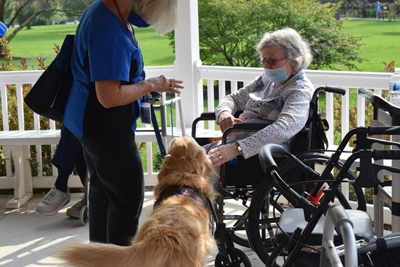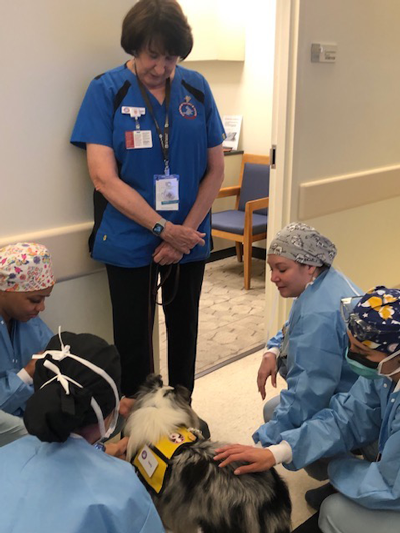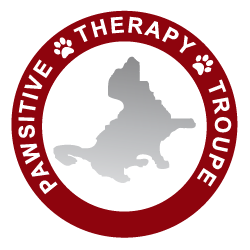Therapy Dog Testing
 Pet Partners PPSAT evaluations will be offered on a regular basis. Testing space is limited.
Pet Partners PPSAT evaluations will be offered on a regular basis. Testing space is limited.
Email
All dogs in the PAWSitive Therapy Troupe must be registered Pet Partners, which means that they have completed Pet Partners training and passed the PPSAT evaluation.
Pet Partners is a nonprofit human health organization leveraging special relationships between animals and people to make a difference in the lives of thousands of individuals, children and families. Its mission is to improve human health through the use of service and therapy animals. Pet Partners (formerly known as Delta Society) began as a small support organization funding research on the impact of animals on the health and well being of humans. Today Pet Partners is an international non-profit organization providing animal-assisted therapy programs and therapy dog screening in 48 states and five countries around the world.* From "People and Pets Making a Difference", Pet Partners brochure. For more information, visit petpartners.org.
Why is Pet Partners registration important?
Pet Partners has rigorous testing procedures in place for ensuring that the animals are:
- People oriented / Sociable
- Comfortable being touched
- Able to enjoy visiting
- Predictable / Reliable in visiting situations
- Controllable at all times
- Able to cope with stressful situations
- Able to inspire confidence in the people with whom they visit
Pet Partners registration means that both the handler and the dog have demonstrated that they can work together safely and effectively as a team in a wide variety of challenging environments. These partnership credentials are highly valued by health care and educational institutions as evidence that the dog and handler will behave appropriately in these environments. Pet Partners registration includes limited commercial general liability insurance (CGLI) coverage for Pet Partner teams working within the scope of Pet Partners policies and procedures
Most Important Characteristics of a Therapy Dog
- A strong bond with its owner- this teaches the dog how to relate to humans. It gives the dog confidence and models for others the loving way that dogs should be treated.
- Well-socialized and outgoing - the dog must like people. A shy or fearful dog can make a patient feel rejected.
- A calm, stable personality that can handle the unexpected, such are a cane dropping, a patient yelling or rough, clumsy petting.
- Under handler control at all time, even in the face of distractions. The larger the dog, the more control is needed. Smaller dogs, on the other hand, although they are usually easier to control, are at risk from rough handling from patients or children.
- Dog CANNOT jump up, paw, bite, snap, mouth, lick, pull on the leash, or bark
- Dogs must be at least one year of age to be tested and must have lived with the handler for at least six months.
Components of the Pet Partners Evaluation (PPSAT)
 Pet Partners Skills Test (PPST)
Pet Partners Skills Test (PPST)
- Accepting a Friendly Stranger—greets appropriately
- Accepting Petting—allows stranger to pet while remaining seated
- Appearance and Grooming—allows handling; appearance appropriate
- Walk on a Loose Leash—no pulling, sniffing, struggling
- Walking Through a Crowd—keeps focus on handler
- Reaction to Distractions—remains calm and focused on handler
- Sit on Command
- Down on Command
- Stay in Place - 15 seconds with handler 10 feet away
- Come When Called
- Reaction to Neutral Dog - sits politely at handler’s side when another team enters room and passes by
The handler / dog team need to pass every item on this portion of the test. The evaluator is also evaluating the guidance and support that the handler gives the dog to help it through the test. The dog and handler should be working as a TEAM, without the use of harsh verbal or leash corrections to maintain good behavior. All interactions between handler and dog should be calm, gentle and supportive.
Pet Partners Aptitude Test (PPAT):
These items all involve role-playing various scenarios that are designed to test an animal’s reaction to stressful situations that may occur on a therapy visit.
- Overall Body Exam - touched and handled all over body by tester
- Exuberant, Clumsy Petting - dog remains calm and under control
- Restraining Hug - dog tolerates a sudden whole body hug
- Staggering / Gesturing Individual - dog is confident when strange person approaches with a halting gait, crying out in pain
- Angry Yelling - dog remains calm
- Two-finger Tap - dog recovers quickly when gently bumped
- Crowded Petting - dog remains calm when surrounded by people all trying to pet the dog at once
- Leave It - dog can pass by a favorite toy / treat on the floor when commanded by handler
- Take a Treat Gently
Many teams do fail this test the first time that they take it, especially young dogs or dogs and handlers that have not taken obedience classes. As long as the initial test score was not a "Not Appropriate", teams may take the test again following further practice. "Not Appropriate" means the dog or handler was clearly assessed as not suitable for therapy work, due to the dog’s extreme fear or aggressive behavior, or the handler’s ineffective or harsh handling.

